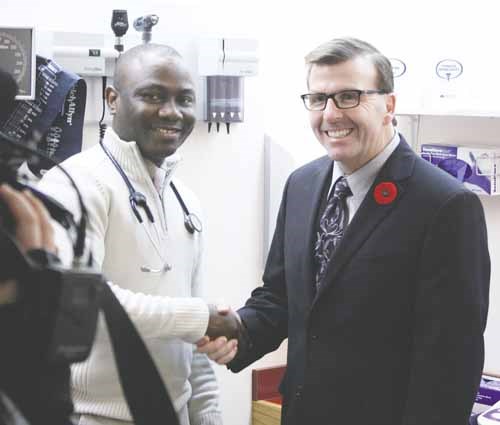The Province's new minister of rural and remote health is touting the Saskatchewan International Physician Practice Assessment (SIPPA) program as a huge success.
At a press conference last week welcoming a new physician, Dr. Olaitan Fajimi, to Yorkton, Greg Ottenbreit said more than 150 new doctors started practices in the province since the program came online in 2011.
And most of those, he said, are serving the rural population.
"I think 96 per cent of our SIPPA graduates are practicing in rural settings, which is important to Saskatchewan because we have such a wide rural area," Ottenbreit said.
The program is a made-in-Saskatchewan solution that addresses the physician shortage by preparing International Medical Graduates for the transition to life in a new country.
Dr. Fajimi graduated on his second attempt.
"SIPPA tends to be focussed on medical knowledge and Canadian culture and being ready for the practice in Canada and that could be quite challengeing to someone coming from Africa, but I would say after passing through SIPPA and getting to know what is required it made practicing in Canada relatively smooth," he said.
Ottenbreit said it is designed to open the borders not close them.
"The way the program is set up, it's set up for success, whereas we saw before doctors that would come ran into some challenges, they weren't quite ready to practice and ran into frustrations, whereas now we see the physicians are coming, they're ready to go to work and they're quite often engaged in rural settings," Ottenbreit said.
After medical school, Fajimi practiced for eight years in Nigeria. He was attracted to Saskatchewan because of the similarity of delivering primary health care in an under-serviced area in a rural setting as he did at home.
"I thought that would be worth trying in a place that's going to be small and we can get to ask people to watch out for us and also get to know who we take care of," he said.
He has now been here six weeks and has not been disappointed saying he has had great support from the health region and the community.
"I see a bright and assuring future in practice in Saskatchewan," he said. "I see a lot of welcoming faces every day when I come here to work, which is quite encouraging."
Ottenbreit is proud of his government's record citing an increase of more than 400 doctors and 2,600 nurses since the Sask Party took office in 2007. He says they have doubled the number of seats at the University of Saskatchewan and more than doubled the number of residency spaces, but it's not enough in the short term.
"Still, there's a huge need," he said. "We can't train enough doctors and that's where SIPPA comes into play, to help us to catch up to where we have to get with physicians in our regions.
Once graduating from the program doctors commit to serving three years in the province.
Dr. Fajimi is one of seven doctors in Yorkton accepting new patients. A complete list is available on the Sunrise website.



